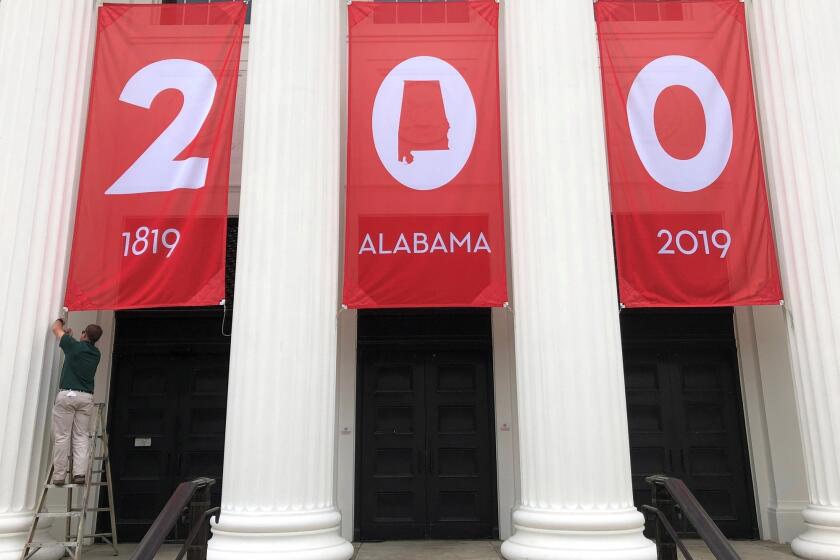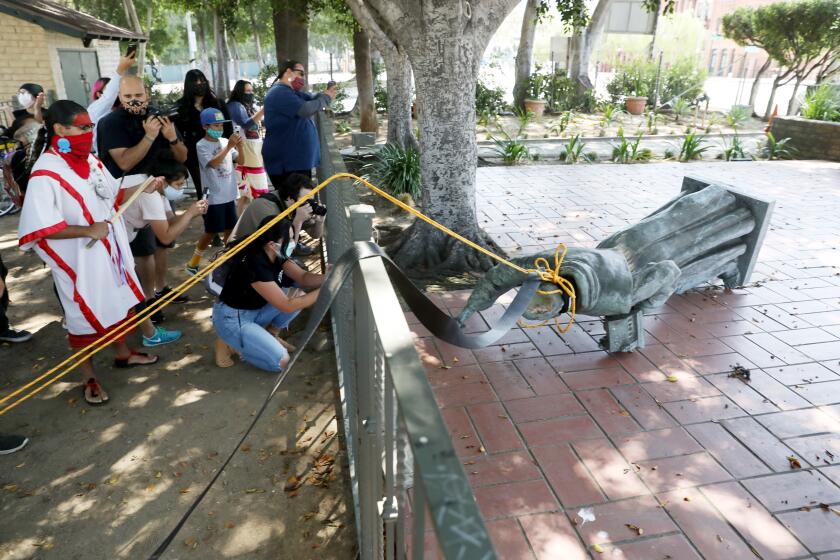Five states approve measures ditching racist language, symbols

BIRMINGHAM, Ala. — Alabama voters reversed themselves from a few years ago and removed vestiges of racial segregation from their state’s constitution. Rhode Island voters also did a U-turn, finally deciding to jettison the word “plantations” from the state’s official name.
In a year when discussions of racial justice have dominated U.S. society, five states voted to purge their official public sphere of words, phrases and symbols that to many were painful reminders of the nation’s history of slavery and the systematic oppression of Black people.
Brendan Skip Mark, who teaches political science at the University of Rhode Island, says the decisions were linked to the revulsion and widespread protests that followed the death of George Floyd, a Black man, in police custody in Minneapolis in May.
“I think we’ve seen a lot of people who are more willing to take concrete steps to address racism than they were in the past,” Mark said.
In addition to the votes in Alabama and Rhode Island, residents of Utah and Nebraska decided to strip their constitutions of unenforceable provisions that allowed slavery as a punishment for criminal convictions. And Mississippi voters approved a state flag without the familiar X-shaped design of the Confederate battle flag.
The votes are a positive sign in a nation where racial tension has always existed, said Stacy Moak, who teaches in the social work department at the University of Alabama at Birmingham.
Alabama’s main state history agency admits helping perpetuate systemic racism by promoting Confederate stories while ignoring those of Black people.
“Affirmative votes for these changes shows a willingness on the part of Americans to provide for a more inclusive community,” Moak said in an email. “These changes, by themselves, are not enough — but they are encouraging signs of progress in the right direction.”
The Alabama measure begins the process of removing Jim Crow language from the 1901 Constitution that was intended to entrench white supremacy. Voters in the mostly white, conservative state had rejected similar proposals twice since 2000.
Courts had long ago struck down the legality of the segregationist provisions, but the language banning mixed-race marriage, allowing poll taxes and mandating school segregation remained.
Glenn Crowell, a Black Republican from Montgomery, was among the roughly 67% of voters who supported scrapping those sections.
“It just doesn’t make any sense nowadays,” said Crowell, 63. Yet another statewide vote will be required to approve the revisions after legislators consider a draft in 2022.
The Mississippi flag, with its Confederate emblem, is drawing criticism from two big forces in the culturally conservative state.
In neighboring Mississippi, about 71% of voters approved the new state flag, which features a magnolia and the words “In God We Trust” instead of a Confederate theme. State legislators voted to retire the old flag in June after the nation erupted in demonstrations following Floyd’s killing.
Mississippi voters also eliminated an 1890s provision that aimed to ensure white control of the state by requiring majorities of both the popular vote and the 122 state House districts to win statewide office. Now, only a majority of the popular vote is required.
To the west, Utah and Nebraska approved provisions similar to Alabama’s to delete constitutional language allowing slavery as a possible punishment in criminal cases.
The measures, which passed by 81% in Utah and 68% in Nebraska, got relatively little attention before the vote.
California confronts its racist, colonial past as statues fall, mascots are renamed and a town debates changing its name that honors a Confederate general.
But the fact that states even placed the measures on ballots shows that protests and the national discussion on racism are having an impact, said Deirdre Cooper Owens, director of the humanities-in-medicine program at the University of Nebraska.
“Symbolism matters, and so does language,” she said.
The vote was closest in Rhode Island, once a hub of the transatlantic slave trade, where about 53% of voters supported the proposal to strip the words “and Providence Plantations” from the state’s formal name, first adopted in 1790. A similar measure had fallen short in 2010.
Like elsewhere in the country, Rhode Island has seen protests over Floyd’s death, and in racially diverse Providence, the capital, a truth commission was established to consider the state’s historic ties to slavery, land seizures, systemic racism and possible reparations.
“This ballot initiative is part of a broader shift in Rhode Island to reconcile with the past,” said Mark of the University of Rhode Island. “I think this is a unique moment in history.”
More to Read
Sign up for Essential California
The most important California stories and recommendations in your inbox every morning.
You may occasionally receive promotional content from the Los Angeles Times.













